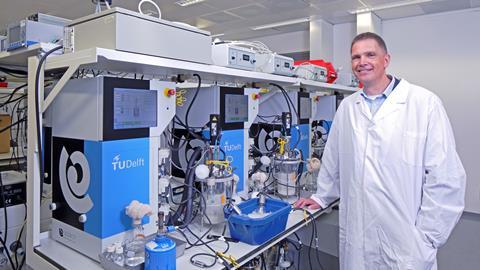NBV-member Jack Pronk, professor of industrial biotechnology at Delft University of Technology, has been awarded the Novozymes Prize 2024 for his pioneering research into the physiology and metabolism of yeast, which has resulted in industrial applications of this micro-organism to produce bioethanol from agricultural waste streams.
Since 1963, the Novozymes Prize is awarded annually to exceptional (European) research achievements that contribute to the development of innovative and sustainable applications of biotechnology. The prize, an initiative of the Danish Novo Nordisk Foundation, comes with a sum of 5 million Danish kroner (~€672,000).
At this point, he does not have a concrete destination for the prize money. Pronk: ‘I am free to spend this amount on scientific research, there is no hard timeline attached and I am going to let it float for a while. Once I start handing over some management tasks in the next few years, there will be more room to take up new leads. If something exciting comes along, it’s great to know that I can simply start, without first having to apply for funding.’
Copenhagen
One tenth of the prize money is specifically allocated to set up a symposium, for which Pronk gets to choose the theme and speakers. ‘Actually, that feels like an additional gift on top. For this, I did reqest a deadline, because it is wise to keep a bit of pressure on.’ The symposium will take place in the autumn at the Novo Nordisk Foundation in Copenhagen. But Pronk will also be travelling to the Danish capital in a few weeks, for the award ceremony on 19 April. And in early June, Pronk will deliver a special Novozymes Prize lecture at his own TU Delft. Interestingly, in 2022 this prize also went to Delft, to Pronk’s colleague Mark van Loosdrecht, professor of environmental biotechnology.
Champagne
Although Pronk is very honoured to receive this prestigious award, he also feels somewhat uncomfortable to be put in the spotlight like this. ‘Science is always teamwork, you can’t achieve anything without cooperation. With teachers, with students, with PhD students and other colleagues at TU Delft, at other universities and with companies at home and abroad. A lot of people are involved in this research and these results.’ The news of the award clearly reached many of those people and that feels like a warm bath. ‘First-year students brought flowers, the student union brought champagne and, I never thought I would say this, the warmth of LinkedIn has also overwhelmed me. All those messages from colleagues, it’s really very special.’
Interface
A tricky question, but why does Pronk think he got the award? ‘The jury motivation won’t be public until April, but from what I understand, it mentions my work in integrating fundamental physiological research and application-oriented genetic interventions in yeast. So, there is the drive to understand the metabolism of microorganisms and from there, work towards applications. Already early on in my career, I found myself at the interface of academia and industry. At that interface, you can do great research without diluting your academic identity. To me, working with industrial colleagues is immensely inspiring, it is exciting to experience the dynamics of industrial research and it teaches you a lot.’
After all these years, is he still interested in yeast? ‘Yeasts are very diverse. Especially in the beginning of my research, the focus was strongly on baker’s yeast, but in recent years other yeast species and fungi have come to play an important role. For example, I am fascinated by fungi with the fantastic name neocallimastigomycota. These are anaerobic eukaryotes, intriguing weird creatures. I don’t exclude other micro-organisms either, but yeasts will always remain in the picture.’













Nog geen opmerkingen